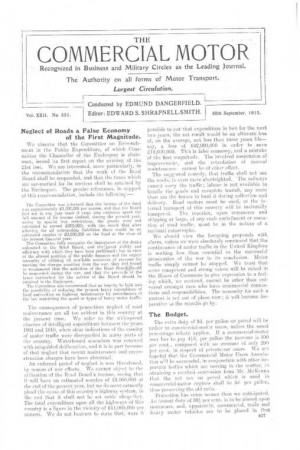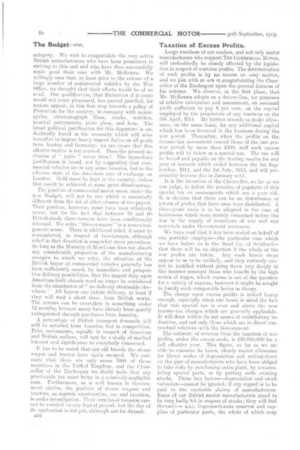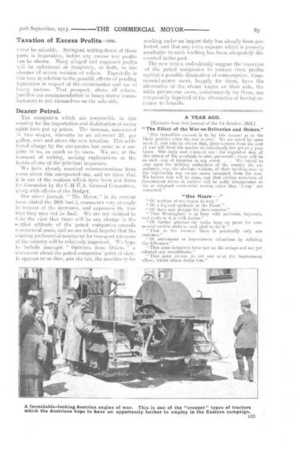neglect of Roads a False Economy
Page 1

Page 2

Page 3

If you've noticed an error in this article please click here to report it so we can fix it.
of the First Magnitude.
We observe that the Committee on Retrench-. ment in the Public Expenditure, of which. Com-mittee the Chancellor of the Exchequer is .chai( man, issued its first. report on the evening of the 21st inst. We are interested, more particularly, in the recommendation that the work of the Road Board shall be suspended, and that the taxes which are ear-marked for its services shall be .retained by the Exchequer. The precise references, in support of this recommendation, include the following:— The Committee was informed that the income of the fund was approximately £1,500,000 per annum, and that the Board had not in any year since it came into existence sprint the full amount of its income (indeed, during the present year, owing to special war restrictions. the grants were not estimated to exceed £300,000);• with the result that 'after allowing fur all outstanding liabilities there would be an estimated surplus of -£3,000,000 on the fund at the close of
the present financial year. .
The Committee fully recognize the importance of the duties entrusted to the Road Bii3azd, and thengreat ability and efficiency with which they have been perfdrmed; but in view of the altered position of the public finances and the urgent necessity of utilizing all available resources of revenue for meeting the charges resulting from the war, they feel bound to recommend that, the activities of the Road Boartttihould be suspended during the war, and that the proceedg of the taxes earmarked for the service of the Board should be retained in the Exchequer.•
The Committee also 4:s:commend that an inquiry be bold into the possibility of reducing the present heavy expenditure of local authorities on highway maintenance by amendments of the law restricting the speed or types of heavy motor traffic.
The consequences of peace-time neglect of road maintenance are all too evident in this country at the present time. We refer to the widespread absence of intelligent exependiture between the years 1901 and 1910, when clear indications of the coming of motor traffic were disregarded in many parts of the country. Waterbound macadam was renewed with misguided deliberation, and it is in part because of that neglect that recent maintenance and reconstruction charges have been abnormal.
An enforced period of neglect is now threatened, by reason of war effects. We cannot abject to the utilization of the Road_ Board's income, seeing that it will have an estimated surplus of ,t3,000,000 at the end of the present. year, but we do most earnestly plead the cause of this country's highway system, to the end that it shall not be .set asidk, altoge+her. The total expenditure upon all the highways of this country is a figure in the vicinity of £14,000,000 per annum. We do not hesitate to state that, were it Possible to cut that expenditure in two for the next two years, the net result would be an ultimate loss of, on the average, not less than three years life— say, a loss or £42,000,000 in order to save £14,000,000. This is false economy, and a mistake of the .first magnitude. The involved suspension of improvement, and the retardation of normal maintenance, cannot be of other effect.
The suggested remedy, that traffic shall not use the roads, is even .more shortsighted._ The railways cannot carry the traffic; .labour is not available to handle the goods and complete transit, any more than are the, horses to haul it during collection and delivery.. Road motors 'must be used, or the internal transport of-this country will be materially hampered. The reaction, upon Commerce and shipping at large, of any such curtailment or cessation of road 'traffic, muet•-be in the nature of a national catastrophe.
We should view the foregoing proposals with alarm, Unless we were absolutely convinced that the Continuanee of motor traffic in the United Kingdom is nothing less" than essential to the successful prosecution of the war to its conclusion. Motor traffic simply cannot be stopped. We trust that some competent and strong voices will be raised in the House of Commons to give expression to aleelirq,', which, we contend, cannot be -other than universal amongst men who have commercial .connections and responsibilities. The necessity for such a protest is not out of place now; it will become im perative the months go by.
The • Budget.
The extra duty of 3d, per gallon on petrol will be unfair to commercial-rnotar users, unless the usual percentage rebate applies. If a commercial-motor user has to pay 40. per gallon the increase is 300 per cent., compaued with an increase of only 200 per cent in respect of private-oar users. We are hopeful -that the Commercial Motor Users Association will be successful, in conjunction with other important bodies.whieh arc moving in the matter, let obtaining a merited concession from Mr. McKenna. that the net tax on petrol which is used in commercial-motor engines shall be 3d. per gallon, thus preserving the old ratio. Protection has come •sooner than we anticipated. An import duty of 33Aper cent. is to be 'placed upon motorcars, and, apparently, commercial, trade and heavy motor vehicle,s are to be placed in that category. We wish to congratulate the very active British manufacturers who have been prominent in striving to this end and who have thus successfully made good their case with Mk; McKenna. We willingly own that, at least prior to.the release of a large number of cornmercial vehicles by the War Office, we thonght that their efforts would be of no avail. Our qualification, that Protection if it came would not come piecemeal, has proved justified, for motors appear, in this first step towards a policy of Protection for the country, in company with motorcycles, cinematograph films, clocks, watches, musical instruments, plate glass, and hate. The broad political justification for this departure is undoubtedly found in the necessity which will arise hereafter to impose heavy import duties on all goods from Austria. and Germeny: we are aware that this ulterior motive is not avowed. DOQS the present inclusion of " parts " cover tires? The immediate justification is found, not by suggesting that commercial vehicles are in any sense luxuries, but in the adverse state of the American rate of exchange on London. Gold must be kept in the country, unless that result be achieved at some great disadvantage.
The position of commercial-motor users, under the new Budget, will not be one which is essentially different from the lot of other classes of tax-payers. Their position, .however, must have been relatively worse, but for the fact that between 70 and SO British-made three-tonners have been conditionally released. We write "three-tonners" in a somewhatgeneric sense. There is additional relief, it must be remembered, in respect of two-tonners, although relief in that direction is somewhat more precarious. So long as_the Ministry of Munitions does not absorb any considerable proportion of the manufacturing energies to which we refer, the situation of the British buyer of commercial vehicles generally has been sufficiently eased, by immediate and prospective delivery possibilities, that the import duty upon American-built chassis need no longer be considered from the standpoint of " no delivery obtainable elsewhere." All buyers can obtain delivery, at least if they will wait a short time, from British works. The arrears can be overtaken in something under 12 months, because many have already been quietly extinguished through purchases from America.
A percentage of British transport demands will still be satisfied from America, hut in competition. Price movements, equally in respect of. American and British makers, will now. be a:study of. marked interest and significance to everybody concerned. .
It has to be noted that our ,old friends the steam el-agon and tractor have again escaped. We estimate that sthere are only some 5000 of these mechines -in the United Kingdom, and the Chancellor of the Exchequer no doubt feels that any practicable tax must bring in a relatively-negligible sum. Furthermore, as is well known_ in Government circles, the position of steam wagons and tractors, as regardsconstruction, use and taxation, is under investigation. Their correlated taxation cannot be resisted on any logical ground, but the day of its application is not yet, although not far distant.
niS
Taxation of Excess Profits.
Large numbelPs of our readers, and not only motor • manufackixers who support THE COMMERCIAL MOTOR, will undoubtedly be closely affected by the legislation in respect of wartime profits. The determination of such profits is by no means an easy matter, and we join with otters t congratulating the Chancellor of the Exchequer upon the general fairness of his scheme. We observe, in the first place, that Mr. McKenna. adopts as a datum-line, far purposes of relative calculation and assessment, an assumed profit sufficient to pay 6 per cent.. on the capital employed by the proprietors of any business on the 5th April, 1914 He further intends to make allowance, on the same basis, for any additional capital which has been invested in the business during the war period. Thereafter, when the profits on the income-tax assessment exceed those of the last prewar period by more than 1100, half such excess profits will be taken as a. special tax. The tax will be levied and payable on the trading results for any year of account which ended between the 1st September, 1914, and the 1st July, 1913, and will presumably become due in January nett.
It is the intention of the Chancellor, so far as we can judge, to follow the practice of painnent-of this special tax on assessments which are a year old. It is obvious that there can be no disturbance or return of profits that have once been distributed. A three-yeaes basis is to. be adopted in the case of businesses which were mainly concerned before the war in the supply of munitions of war and war materials under Government contracts.
We have read that it has been stated on behalf of one patriotic, employer—the particular ease which we have before us is the Steel Co. of Scotland— that there will be no objection if the whole of the war profits are taken. Any such heroic steps appear to us to be unlikely, and they certainly cannot be justified without going down very deeply in like manner amongst those who benefit. by the high scales of wages, which course is out of the question for a variety of reasons, however it might be sought to justify such comparable levies in theory.
The charge upon excess profits is indeed heavy enough, especially when one bears in mind the fact that this special tax is over and above the new income-tax charges which are generally applicable. It will draw within its net scores of contributory industries, and not only those which are in. direct con tractual relations with the Government. .
The estimate of revenue from the taxation of war profits, under the excess scale, is /30,000,000 for a full effective year. This figure, so far as we are We to examine its bases, clearly makes allowance for liberal scales of depreciation and writing-down on the part of manufacturers who have been obliged to take risks by purchasing extra plant, by accumulating special parts, or by putting aside existing stocks. These two factors—depreciation and stock valuation—cannot be ignored, if any regard is to be paid to the equitable claims of manufacturers. Some of our British, motor manufacturers stand to be very badly hit in respect of stocks; they will find themselves with disproportionate reserves and supplies of particular parts, the whole of which may never be saleable. Stringent writing-down of these parts is imperative, before any excess war profits can be shown. Many alleged and supposed profits will be ephemeral or imaginary, or both, in the absence of severe revision of values. Especially is I his true in relation to the possible effects of pending legislation in respect of the construction and use of heavy motors. That -prospect, above all others, justifies our recommendation to heavy-motor manufacturers to put themselves on the safe side.
Dearer Petrol.
The compani?s which are responsible in this country for the importation and distribution of motor spirit have put up prices. The increase, announced in two stages, amounts to an all-round 2d. per gallon, over and above the new taxation. This additional charge by the companies has came as a surprise to us, as much as to users. We are, at the moment of writing, seeking explanations at the hands of one of the principal importers.
We have already received communications from users about this unexpected rise, and we know that it is one of the matters which have been put down for discussion by the C.M.U.A. General Committee, along with effects of the Budget.
Our sister journal, " The Motor," in its current issue (dated the 28th inst.), comments very strongly in respect of the increases, and expresses the fear that they may not be final. We are not inclined to take the view that there will be any change in the settled attitude of the petrol companies towards commercial users, and we are indeed hopeful that the existing preferential treatment for transport interests of the country will be relatively improved. We hope to include amongst " Opinions from Others " it statement about the petrol companies' point of view. it appears to us that, qua the tax, the machinery for working under an import duty has already been perfected, and that any extra expense which is properly ascribable to such working has been adequately discounted in the past.
The new prices undoubtedly sugge..st the intention of the petrol companies to protect their profits against a. possible diminution of consumption. Commercial-motor users, happily for them, ha e. the alternative of the steam wagon on their side, the while private-car users, unfortunately for them, are temporarily deprived of the alternative of having recourse to benzole.






















